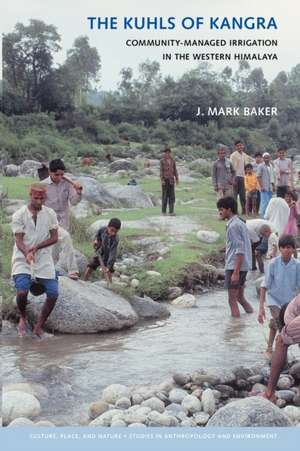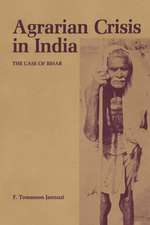The Kuhls of Kangra – Community–Managed Irrigation in the Western Himalaya: Culture, Place, and Nature
Autor J. Mark Baker, K. Sivaramakrishnaen Limba Engleză Paperback – 18 oct 2007
In this book, Mark Baker offers a comprehensive explanation for the durability of the kuhls of Kangra in the face of recurring environmental shocks and socioeconomic change. In addition to describing how farmers use and organize the kuhls, he employs varied lines of theory and empirical data to account for the persistence of most kuhls (and the demise of a few) in the late twentieth century. Into his explanatory framework he incorporates the history of regional politics and economics as they affected kuhls during the precolonial, colonial, and postcolonial periods; the role of state involvement in kuhl construction and management; the benefits of exchanges of labor and water among members of networked kuhls; and the ways in which kuhl systems are embedded in and reproduce core cultural beliefs and practices.
Scholars interested in common property resource regimes have long focused on self-organizing, community-based irrigation systems. Yet their theories cannot entirely account for the durability of common property regimes under the extreme conditions of ecological stress, economic change, and social differentiation that exist in Kangra. Baker adds new dimensions to such theories by reaching beyond them to incorporate "exogenous" factors such as the roles statemaking practices play in common property resource regimes, the importance of networks in buffering individual resource regimes from environmental stress, and the ways in which regimes are sites for reproducing and occasionally contesting the relations that constitute place and region. In doing so, he advances a new way of thinking about community-based systems of resource management--a timely subject given recent trends in many countries toward the devolution of authority over natural resource management from government to rural communities.
Din seria Culture, Place, and Nature
-
 Preț: 216.14 lei
Preț: 216.14 lei -
 Preț: 215.61 lei
Preț: 215.61 lei -
 Preț: 216.48 lei
Preț: 216.48 lei -
 Preț: 215.92 lei
Preț: 215.92 lei -
 Preț: 278.16 lei
Preț: 278.16 lei -
 Preț: 263.26 lei
Preț: 263.26 lei -
 Preț: 264.61 lei
Preț: 264.61 lei -
 Preț: 263.05 lei
Preț: 263.05 lei -
 Preț: 266.52 lei
Preț: 266.52 lei - 23%
 Preț: 645.33 lei
Preț: 645.33 lei -
 Preț: 264.99 lei
Preț: 264.99 lei - 23%
 Preț: 646.51 lei
Preț: 646.51 lei - 23%
 Preț: 646.22 lei
Preț: 646.22 lei -
 Preț: 257.86 lei
Preț: 257.86 lei -
 Preț: 261.72 lei
Preț: 261.72 lei -
 Preț: 261.72 lei
Preț: 261.72 lei -
 Preț: 265.76 lei
Preț: 265.76 lei -
 Preț: 266.31 lei
Preț: 266.31 lei -
 Preț: 267.51 lei
Preț: 267.51 lei -
 Preț: 270.93 lei
Preț: 270.93 lei -
 Preț: 262.67 lei
Preț: 262.67 lei -
 Preț: 261.14 lei
Preț: 261.14 lei -
 Preț: 257.66 lei
Preț: 257.66 lei -
 Preț: 271.53 lei
Preț: 271.53 lei -
 Preț: 262.11 lei
Preț: 262.11 lei -
 Preț: 258.85 lei
Preț: 258.85 lei -
 Preț: 262.29 lei
Preț: 262.29 lei - 14%
 Preț: 642.82 lei
Preț: 642.82 lei -
 Preț: 270.23 lei
Preț: 270.23 lei
Preț: 264.61 lei
Nou
Puncte Express: 397
Preț estimativ în valută:
50.64€ • 52.67$ • 41.81£
50.64€ • 52.67$ • 41.81£
Carte tipărită la comandă
Livrare economică 15-29 aprilie
Preluare comenzi: 021 569.72.76
Specificații
ISBN-13: 9780295987644
ISBN-10: 0295987642
Pagini: 272
Ilustrații: 30 illustrations, map
Dimensiuni: 153 x 228 x 26 mm
Greutate: 0.45 kg
Editura: MV – University of Washington Press
Seria Culture, Place, and Nature
Locul publicării:United States
ISBN-10: 0295987642
Pagini: 272
Ilustrații: 30 illustrations, map
Dimensiuni: 153 x 228 x 26 mm
Greutate: 0.45 kg
Editura: MV – University of Washington Press
Seria Culture, Place, and Nature
Locul publicării:United States
Recenzii
This book provides a comprehensive account of the persistence and transformation of kuhls the centuries-old community managed irrigation systems in the western Himalaya under conditions of intermittent environmental stresses and ever-increasing pace of socioeconomic change.... It contains a wealth of information related to the ethnographic, historical, and sociocultural aspects of human-environment interactions in an important region of South Asia. For this and its skillful integration of theory and empirical evidence, it will be invaluable to colleagues and advanced students alike. American Anthropologist"The Kuhls of Kangra represents a significant contribution to land and resource use issues in south Asia and offers a trenchant, grounded critique of common property resources theory." Vinay K. Gidwani, University of MinnesotaOf interest to anthropologists and historians of India, I expect this to become one of the major classics in the field. Elinor Ostrom, Indiana University
Notă biografică
Cuprins
Preface
Introduction
1. An Explanatory Tapestry
2. The Dynamic Landscape of Kuhl Irrigation
3. Statemaking and Irrigation in Kangra
4. Patterns of Change
5. Networks of Interdependence
6. Dynamic Regimes, Enduring Flows
Appendix 1: A Note on Methods
Appendix 2: Two Kuhl Stories Recounted by Shyam Lal Sharma
Appendix 3: Summary Characteristics of Kuhl Regimes of the Neugal Watershed
Notes
Glossary
References
Index
Descriere
Offers a comprehensive explanation for the durability of the kuhls of Kangra in the face of recurring environmental shocks and socioeconomic change.


















